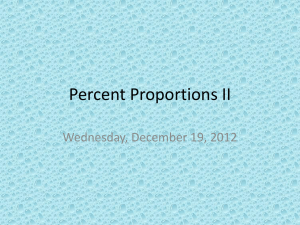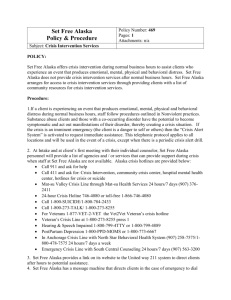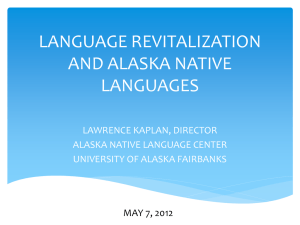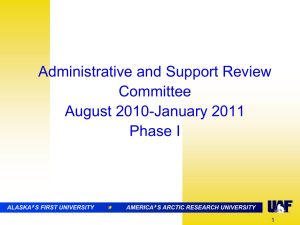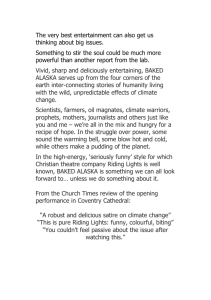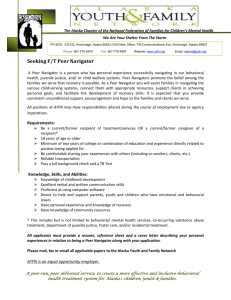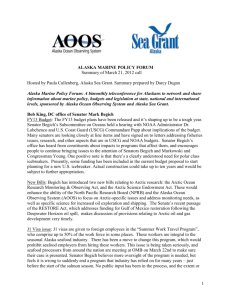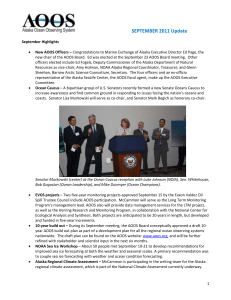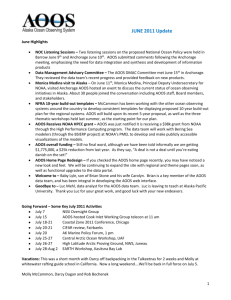Nov 2012 - Alaska Ocean Observing System
advertisement
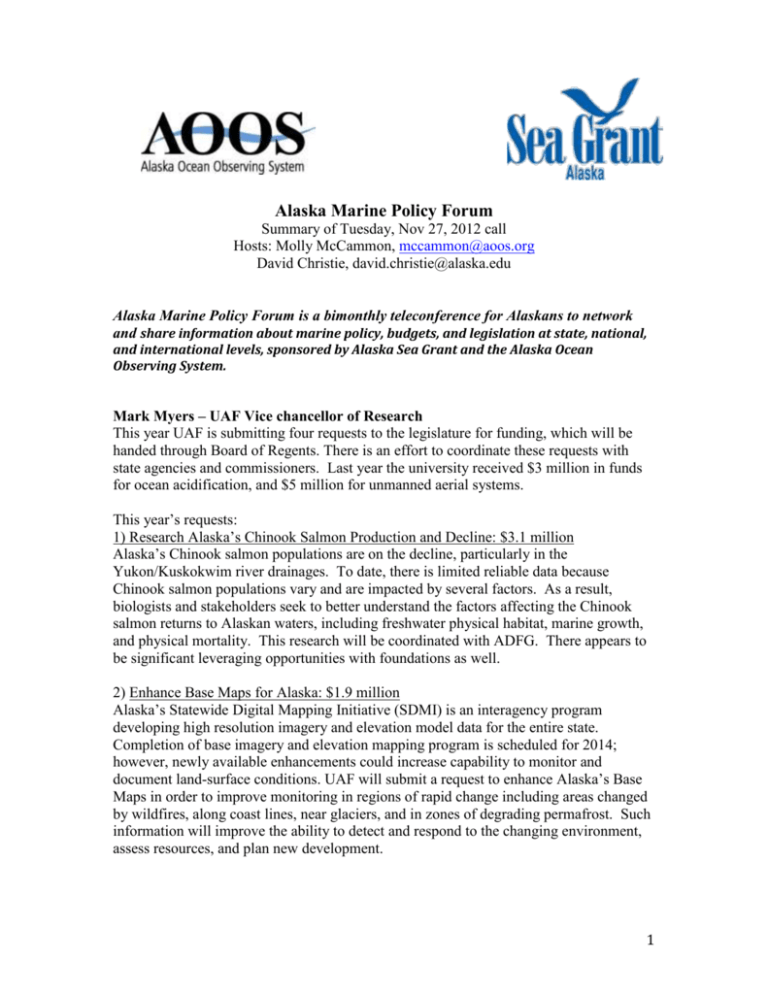
Alaska Marine Policy Forum Summary of Tuesday, Nov 27, 2012 call Hosts: Molly McCammon, mccammon@aoos.org David Christie, david.christie@alaska.edu Alaska Marine Policy Forum is a bimonthly teleconference for Alaskans to network and share information about marine policy, budgets, and legislation at state, national, and international levels, sponsored by Alaska Sea Grant and the Alaska Ocean Observing System. Mark Myers – UAF Vice chancellor of Research This year UAF is submitting four requests to the legislature for funding, which will be handed through Board of Regents. There is an effort to coordinate these requests with state agencies and commissioners. Last year the university received $3 million in funds for ocean acidification, and $5 million for unmanned aerial systems. This year’s requests: 1) Research Alaska’s Chinook Salmon Production and Decline: $3.1 million Alaska’s Chinook salmon populations are on the decline, particularly in the Yukon/Kuskokwim river drainages. To date, there is limited reliable data because Chinook salmon populations vary and are impacted by several factors. As a result, biologists and stakeholders seek to better understand the factors affecting the Chinook salmon returns to Alaskan waters, including freshwater physical habitat, marine growth, and physical mortality. This research will be coordinated with ADFG. There appears to be significant leveraging opportunities with foundations as well. 2) Enhance Base Maps for Alaska: $1.9 million Alaska’s Statewide Digital Mapping Initiative (SDMI) is an interagency program developing high resolution imagery and elevation model data for the entire state. Completion of base imagery and elevation mapping program is scheduled for 2014; however, newly available enhancements could increase capability to monitor and document land-surface conditions. UAF will submit a request to enhance Alaska’s Base Maps in order to improve monitoring in regions of rapid change including areas changed by wildfires, along coast lines, near glaciers, and in zones of degrading permafrost. Such information will improve the ability to detect and respond to the changing environment, assess resources, and plan new development. 1 3) Improving Arctic Oil Spill Response through Dedicated Science and Technology Center: $1.5 million An Arctic Oil Spill Response Science Technology Center will allow UAF to partner with State and Federal agencies, industry and other academic institutions to support wise decision-making regarding oil spill prevention and response. The proposed center will help promote integrated research for oil spills, improving our fundamental understanding of ecosystems, and specific technologies to approach oil spills (including trajectory models, gliders, sensor packages, and use of the new research vessel Sikuliaq). Goals include developing the ability to map oil movement under ice, and understanding the physics of oil movement in ice dominated waters. UAF is looking for a way to integrate multiple smaller grants. 4) Partnership to Develop Statewide Energy Solutions: $5.5 million Most states with energy endowments have integrated energy center at the major institutions. This funding would host an integrated in-state energy policy center at UAF, allowing the university the ability to objectively and critically analyze energy alternatives in Alaska. UAF would leverage the energy technology testing and development success of the Alaska Center for Energy and Power (ACEP) to advance research in target areas of energy analysis and fossil fuel research. Assessments for natural gas development, proposed coal-to-liquids and gas-to-liquids projects, hydropower, carbon sequestration and other strategies could be conducted to inform Alaska’s leaders and help ensure Alaska’s resources are developed in a prudent and economically beneficial manner. David Christie, Alaska Sea Grant, UAF The 28th annual Lowell Wakefield Symposium sponsored by Alaska Sea Grant is this March 26-29th in Anchorage. The deadline for abstracts was Nov 30th. The theme of this year’s symposium is “Responses of Arctic Marine Ecosystems to Climate Change”. Find more information here: http://seagrant.uaf.edu/conferences/wakefield/index.html NOAA’s Science Advisory Board has a working group focused on research in NOAA. A report will soon be released with recommendations on what NOAA should do to move forward with research activities. Check the advisory board website: http://www.sab.noaa.gov/ John Farrell, US Arctic Research Commission The Whitehouse just announced two new members to the US Arctic Research Commission. The seven-member commission functions as the federal government's central Arctic policy and research body, charged with easing cooperation among federal, state and local governments as well as other nations with respect to basic and applied Arctic research. The two new members are Edward Itta of Barrow (former North Slope Borough Mayor) and Jim McCarthy (a professor of oceanography and Arctic science at Harvard). 2 Additionally, the USARC recently released a white paper on arctic oil spill research with recommendations from the commission. It includes a summary of what entities are working on different aspects, and future work. Find it here: http://www.arctic.gov/publications/oil_spills_2012.html Molly McCammon, Alaska Ocean Observing System Alaska Marine Science Symposium The 2013 Alaska Marine Science Symposium will be held Jan 21-25th at the Captain Cook in Anchorage. This is a free event. Early registration ends Dec 3rd (it will guarantee you and abstract book and a lunch). If you would like to hold a workshop or side meeting during symposium week, the deadline is also Dec 3rd. Contact Rosa at meehan@aoos.org to discuss details. Website: http://www.alaskamarinescience.org/ Industry/NOAA Data sharing Agreement An MOU data sharing agreement has been signed between NOAA and the oil companies active in the Chukchi (Conoco Phillips, Shell, and Statoil). The data from industry research ($40-$50 million dollars worth) will be provided to NOAA, and made publicly available through the Alaska Ocean Observing System. Annex 1 of the agreement focuses on met-ocean data and was the first to be signed. This fall, real-time was streamed to the NDBC and AOOS in real-time. AOOS has also received the historic metocean data which will soon be publicly available. Annex 2 focuses on environmental data and is currently in the signing process. The data will be served through AOOS’ Research Workspace and available to anyone upon request. AOOS will be hosting the data at no cost, and funding will be required to visualize the data or transform it into other user-friendly formats. Industry contractors have generated metadata which should be in good shape. Thurs Nov 29th is the deadline for nominations to NOAA Science Advisory Board. This is an influential federal advisory committee to the NOAA administrator and line offices. No one from Alaska is currently on the board. If you are interested, submit your name, or Molly can submit it for you. Upcoming Events: Dec 3-4 Polar Bear Deterrence Workshop, Anchorage Dec 6-7 Cook Inlet Regional Citizens Advisory Council, Anchorage Dec 14-15 Circumpolar Biodiversity Monitoring Program, Vancouver BC Dec 17-19 Polar Research Board and NAS Arctic Oil Spill Committee, DC Jan 21-25 Alaska Marine Science Symposium, Anchorage Next Alaska Marine Policy Forum: Wednesday, Jan 30th at 1pm (note the deviation from our regular 3rd Wednesday of the month due to the Alaska Marine Science Symposium) 3
